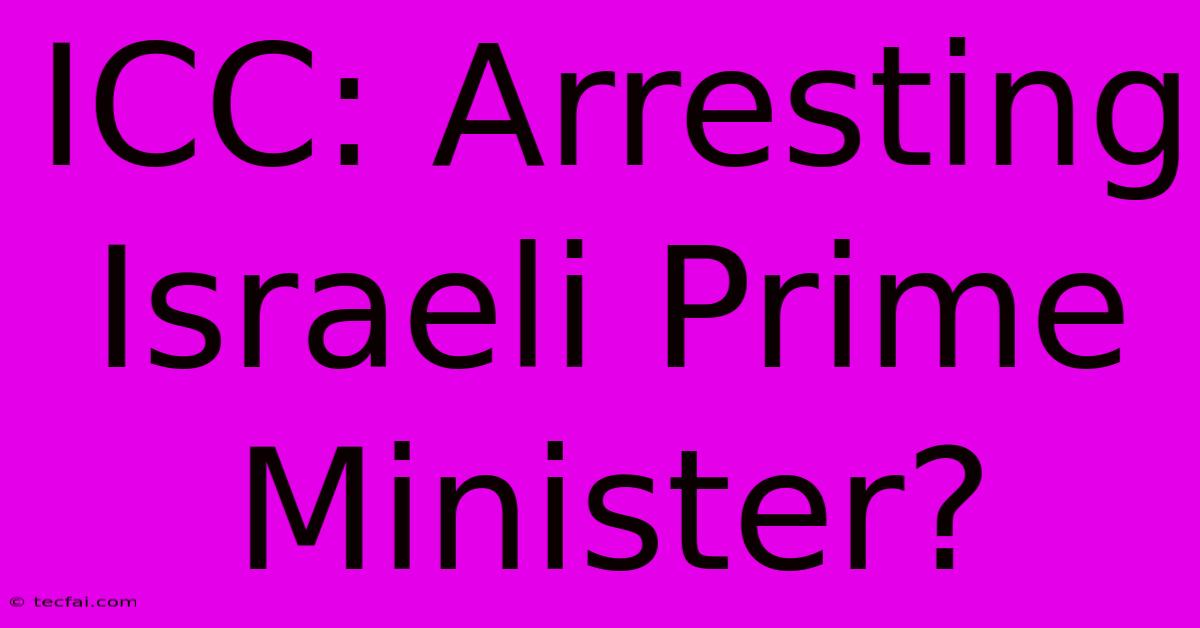ICC: Arresting Israeli Prime Minister?

Discover more detailed and exciting information on our website. Click the link below to start your adventure: Visit Best Website tecfai.com. Don't miss out!
Table of Contents
ICC: Arresting Israeli Prime Minister? Navigating International Law and Geopolitical Tensions
The International Criminal Court's (ICC) potential involvement in investigating and potentially arresting Israeli Prime Minister Benjamin Netanyahu has ignited a firestorm of debate, highlighting the complex interplay between international law, national sovereignty, and geopolitical realities. This situation underscores the considerable challenges the ICC faces in exercising its mandate in politically charged environments.
Understanding the ICC's Jurisdiction
The ICC's primary function is to investigate and prosecute individuals accused of the gravest crimes under international law: genocide, war crimes, crimes against humanity, and the crime of aggression. Crucially, the Court's jurisdiction is not universal. It only applies to situations where a state is a party to the Rome Statute (the treaty establishing the ICC), or where the UN Security Council refers a situation to the Court. Israel is not a party to the Rome Statute.
However, the ICC's jurisdiction can extend to situations occurring on the territory of a non-state party, provided the situation is referred to the Court by the Security Council or if the state where the alleged crimes occurred accepts the Court's jurisdiction. This is where the complexities of the Israeli-Palestinian conflict come into play.
The Palestinian Perspective and the ICC's Investigation
Palestine, which declared itself a state in 2012, acceded to the Rome Statute in 2015. This unilateral declaration of acceptance triggered a long-running debate about the legality and implications of Palestine’s actions, which, in turn, triggered an ICC investigation into alleged war crimes committed in the Palestinian Territories.
The ICC's Prosecutor, Karim Khan, has emphasized the Court's commitment to impartiality and the thoroughness of its investigations. While investigations are ongoing, accusations against individuals within the Israeli government—including potentially the Prime Minister—raise significant questions about the potential for arrests and prosecutions.
The Israeli Response and International Condemnation
Israel vehemently rejects the ICC's jurisdiction over its actions, considering the investigation illegitimate and biased. Israel argues that the ICC is overstepping its bounds and interfering in Israeli internal affairs, further highlighting the deep-seated tensions between the ICC and the Israeli government. The Israeli government has implemented measures to counter the ICC's investigation. This response is largely supported by the United States, which has imposed sanctions targeting the ICC's efforts.
This strongly opposed stance by Israel, and its powerful allies, raises concerns about the practical challenges facing the ICC in enforcing its decisions. The ability of the ICC to arrest and prosecute an individual like the Israeli Prime Minister, against the will of a powerful state, is severely limited.
Navigating the Legal and Political Minefield
The ICC's investigation presents a delicate legal and political dilemma. The potential arrest of a sitting Prime Minister would undoubtedly escalate geopolitical tensions and potentially destabilize the region. Questions of international law, state sovereignty, and political expediency are intertwined, making any outcome highly unpredictable.
The future trajectory of this situation remains unclear. However, several scenarios are possible, including:
- No arrest: The ICC might opt for alternative legal actions, focusing on lesser charges or prioritizing other cases.
- Limited cooperation: The investigation continues, possibly leading to indictments but no arrests in the foreseeable future.
- Escalation: An arrest attempt could spark a major international crisis, with significant regional and global consequences.
The ICC's efforts to pursue justice in the face of powerful political opposition demonstrate the challenges faced by international courts in upholding the rule of law in complex and highly contested geopolitical contexts. This situation will likely continue to fuel the ongoing debate about the ICC's legitimacy, effectiveness, and its role in a world characterized by deep political divisions.

Thank you for visiting our website wich cover about ICC: Arresting Israeli Prime Minister?. We hope the information provided has been useful to you. Feel free to contact us if you have any questions or need further assistance. See you next time and dont miss to bookmark.
Featured Posts
-
Community Impact Penn State Map Live
Nov 22, 2024
-
Uwcl Arsenal Women Vs Juventus Preview
Nov 22, 2024
-
Adani Indictment Us Charges Kenya Deal Hit
Nov 22, 2024
-
Ground Beef Recall 160 000 Pounds
Nov 22, 2024
-
Summer Food Science School Penn State
Nov 22, 2024
